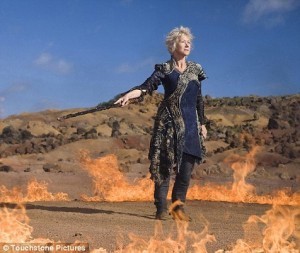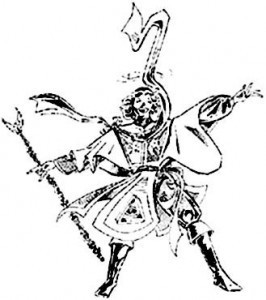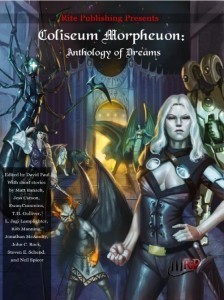L. Jagi Lamplighter's Blog, page 61
February 2, 2013
Happy Birthday, Elf King!
Happy Groundhog Day! Luckily it was overcast ten years ago, or Juss may have chosen to pop back in.

Last spring
As it is, he is a thriving ten year old, today. He got an unexpected Megazord for his birthday. I have almost never seen such a happy kid. But I could tell that he had watched a lot of toy reviews with his brother in the last six months when he declared in delight:
"This is the best transfir to the American Audience ever! Thank you, Bandai America!"

Two or three Halloween's ago
(PS. For those unfamiliar with the nickname, Juss's middle name is Oberon. )
January 30, 2013
The Tempest with Helen Mirren as Prospera
I finally saw the new version of Shakespeare's TEMPEST with Helen Mirren playing Prospera that came out last year. I had not heard much about it, so I thought perhas it was not good.

It was excellent!
The best version of THE TEMPEST I've ever seen. They did a marvelous job of bringing out the character and conflict of each part. Lines I had thought were dull really came alive. I was very impressed.
Wright’s Writing Corner: Angels We Have Heard On High!
Here is a repost of my Angel's article. ;-)

The first Great Idea listed by Mortimer Adler happens to be Angels. So, today, I thought I would write about writing about angels.
Some things are intrinsically hard to write about. Angels may be one of those things. I have almost never seen them done well in fiction. I have, however, read really stirring accounts of people who believe that they have seen real angels. While I have no way to judge the veracity of their stories, I can feel the power of the narrative. It come with a sense of awe and wonder.
Somehow, that sense almost never appears in depictions of angels in fantasy and science fiction. Depictions of angels in genre literature and media is almost universally negative. They are the real bad guys, while demons are misunderstood, emo, moody hunks. Or they are weak. Angels are rigid. Angels are hand-wringers. Angels are boring.
Only the ones who fall in love…emphasis there on the word fall…are even the slightest bit interesting. When they fall, then they get to be the cute scruffy hunks.
A perfect example of the way angels are often handled is Neil Gaiman’s Angel Islington from Neverwhere. I love Neverwhere, but Islington is just a villain, and not even a particularly inspiring one. Still, Islington does stand out in my mind as the archetypical example of that kind of wimpy evil angel that seems so popular now. One sees these angels in books and TV shows. They are also popular in a certain kind of movie.
Why?
Well…a number of reasons.
First of all, it is hard to have a powerful force of good and still have a story. Because the logical question then becomes: well, if they are good, and then are powerful…why haven’t they solved all the problems?
Interesting question.
Problem is that the author has to answer that question in a way that makes sense in his story world. Not that easy to do.
A popular answer is: the prime directive. “We angels cannot interfere in the squabbles of men because…we are too benevolent. You must use your free will.” Angels do not interfere for the same reason that parents don’t interfere when their older son is beating their younger son at Monopoly and the younger one is in tears. The adult might comfort the child, but he does not win the game for him. That would not be fair.
In real life, this may make sense, but it is hard to make it satisfying in a story. In real life, letting go of the grip of the world around us and turning to God may be a goal…but in a story, we, the writers, need to do the opposite. To suck people into our imaginary world, to get them to suspend their disbelief. It is difficult to keep the reader in a story where we are telling the reader that the happenings are not important enough for the real good guys to bother with.
A word about real life. I have often wondered how traditional Christians can buy the ‘we don’t interfere like a parent’ theory…when losing the game means going to Hell. I do understand how it would work in according to my church—where Hell is a state of mind you can escape from if you turn to God—or in the world of Near Death Experiences, which also seems to include a Hell one can be prayed out of.
But if Hell is real and permanent? Well, I might not stop my older son from winning the game…but I’d sure stop him from hurting or killing his brother!
But back to the world of fiction.
There are other ways to solve the dilemma. When it was my turn, I turned to some ideas from my church and from C. S. Lewis and decided that Heaven and heavenly things were more substantial than earthly things, not less so. So, when the angel comes into the world, it begins to warp around her and seem flimsy. She can only stay a little while…like a child’s contraption that an adult would break if he climbed into it. So, the parent can only come help for a moment, when the child is really stuck. Otherwise, they have to figure it out on their own. This gave them a slightly stronger reason for not hanging around.
Are angels ever done right? Yes, occasionally, they are. When the spirit of a true testimonial of God’s messengers in our life is brought to the story. Christmas stories often capture this mood.
One of my favorite angels was Rafe Kovick on the soap opera Port Charles. Back in December of some year about a decade ago, I was working out at the gym in front of a large bank of TVs and I started watching this soap opera…only time I have ever watched one. It had on it this character who looked like a scruffy bad boy, only—he was an angel. And instead of all the terrible things that usually happen on soaps, this one month, in honor of Christmas, the angel would come by and something unexpectedly good would happen. (He was really there to hunt a vampire, but he could pause to perform a few other miracles as well.)
It was just delightful to watch. Every day, something else uplifting occurred. I loved it.
And that is what makes the “real” stories about angels so wonderful…that sense of unexpected joy, of something good appearing where there seemed to be only sorrow, of eucatastrophe…something, surprisingly and unexpectedly good.
As soon as Christmas was over. The angel fell in love, fell, and became uninteresting. But he was so cool when he was an angel!
So…what is your favorite handling of angels in literature or media?
January 29, 2013
Overheard at the Wright Household
Juss, dancing around the kitchen, "The donut dance! The donut dance! My dance of super powered donuts!" Then he pauses and says sheepishly. "All right. It's not super powered. It's just an ordinary donut dance."
January 28, 2013
Coliseum Morpheuon — On Sale Now!
A neat anthology in which I have a story about a foot-sore angel with a fritzy neon halo.
January 25, 2013
January 23, 2013
Wright’s Writing Corner: Great Ideas Series Relaunch
At long last, I am returning to the Writing the Great Book series that I started two year ago. I am reposting this opening post. I will then, over the next couple of weeks, repost my essays on Angels and Animals. Once that is done, we will begin anew with the rest of Mortimer Adler’s Great Ideas, starting with the dreaded Aristocracy (dreaded, because I have tried to write this post several times, and it’s never come out right.)

Mephistopheles Prospero is excited to hear about the Great Ideas relaunch
Here is the previous post:
Before we discuss the quality that make a great books, we should probably discuss what makes a book great.
First, we should distinguish between the two uses of the term “great books.” For clarities sake, I shall refer to them as great books and Great Books.
A great book is a book you love. Perhaps, it is a book that changed your life. Perhaps, it is one you want to read again and again. Perhaps, it is one that rocked your world, or uplifted you in a time of darkness. Perhaps, it stirred your heart, ignited your passion, or brought you comfort. It is a book that touched you.
A Great Book is a book that did to a whole lot of people what a great book did to you. It is the same thing on a society level: a book that rocked many people’s world; or that introduced new ideas into society; or that led millions of readers to “burn with the bliss and suffer the sorrow of all mankind.” * It is a book that so many people found great that it outlasted the sandblast of Time, which otherwise clears away all things.
*My dad’s favorite quote from the Hindu Bhagavad Gita. I have also seen it written: “burns with the bliss and suffers with the sorrows of every creature”.
So what makes a book great?
Well, here is an example:
When I was young, I chose to attend St. John’s College in Annapolis, MD because of their Great Books program. I knew I was interested in writing, and I wanted to read the best of what other people had written—the books that touched so many people that they were still around hundreds or, in some cases, thousands of years later.
We read many fascinating books. Some I felt was good, some I could have done without. But there was one book that stood out to me above all the others, one book I thought was truly great, which really did make me burn with the bliss and suffer the sorrows of its characters.
I loved it. I have read it again and again. I turn to it when I need help and inspiration with my own writing. In many ways, I think if it as the best of all novels. I felt that the whole four years, and all the money spent, were worth it for me to have read that one book.
The book was War and Peace.
For me, War and Peace is a Great Book and a great book. It is a book that touched millions of hearts, and one of them was mine.
For our series on Writing the Great Book, we’ll be looking at both kinds, both the books that touched our heats and the books that touched the hearts of people throughout the world and throughout history.
Here again are the Great Ideas:
Angel, Animal, Aristocracy, Art, Astronomy And Cosmology, Beauty, Being, Cause, Chance, Change, Citizen, Constitution, Courage, Custom And Convention, Definition, Democracy, Desire, Dialectic, Duty, Education, Element, Emotion, Equality, Eternity, Evolution, Experience, Family, Fate, Form, God, Good And Evil, Government, Habit, Happiness, History, Honor, Hypothesis, Idea, Immortality, Induction, Infinity, Judgment, Justice, Knowledge, Labor, Language, Law, Liberty, Life And Death, Logic, Love, Man, Mathematics, Matter, Mechanics, Medicine, Memory And Imagination, Metaphysics, Mind, Monarchy, Nature, Necessity And Contingency, Oligarchy, One And Many, Opinion, Opposition, Philosophy, Physics, Pleasure And Pain, Poetry, Principle, Progress, Prophecy, Prudence, Punishment, Quality, Quantity, Reasoning, Relation, Religion, Revolution, Rhetoric, Same And Other, Science, Sense, Sign And Symbol, Sin, Slavery, Soul, Space, State, Temperance, Theology, Time, Truth, Tyranny And Despotism, Universal And Particular, Virtue And Vice, War And Peace, Wealth, Will, Wisdom, World.
Which ideas are you looking forward to?
January 19, 2013
Overheard at the Wright Household
Daddy, on the subject of whether or not the boys had to eat all of the dinner.
"Yes. Because we are training you to be a guru. Gurus are people who can walk on hot coals, sleep on beds of nails, and eat unidentified vegetables."
Also:
John: "I am starting a new roleplaying game, the Kitchen Sink Game. You can play any character you can think of."
Juss, without losing a beat, "Can I play Galactus?"
John: "No."
January 16, 2013
Wright’s Writing Corner — Writing Tips
After basically a break of two years, I am starting up my Wright's Writing Corner again. I will pick up where I left off with the Great Ideas, but first, I am reposting my Writing Tips. Each tip has a link to the post I wrote on that topic.
Enjoy!

Writing Tips
Two Strings: Two separate issues need to be going in each scene.
The Trick: Raising expectations in one direction but having the story go in the opposite direction. It sounds simple, but it may be the most useful writing technique of all…the book Rebecca by Daphne du Maurier is just the trick over and over again.
The Foil: The trick applied to people. Use other characters to showcase the strengths of your main characters and to make them seem extraordinary. Example: Nausicaa’s guys.
Senses: Add three to five senses to every description.
Interior Dialogue: Readers don’t trust dialogue. Have your characters think, and have what they think be juxtaposed to the dialogue, showing a new angle.
Open active: Start scene changes underway and then explain how you got there…unless change significant.
Measurements by example: Tall as a man, rather than six feet high, where applicable.
Romantic Tension: Part 1, Part 2, Part 3 To make a character seem attractive to another character (at least to women) list a character trait of character A and an emotional reaction to this trait from character B). (example: she had an air of mystery that intrigued him. Or, her shy retiring manner made him wish he could protect her.)
Payload: Part 1, Part 2 Every scene/fight/sex scene should have some moment that moves the plot along or heightens awareness, drawing the reader into something greater. Villains should reveal something important during a fight, and romantic partners should learn more about each other or reveal secrets.
Also, every character should have at least one paragraph/scene where the inner motivation of that character is revealed.
Dicken’s Trick: Using action in description: “There is not just a kettle on the fire, it is boiling over.” “Horses at the cab stands are steaming in the cold and stamping. When people enter a room they are sneezing or hiding something in their pockets.”
Ping Pong Dialogue: Have some dialogue go back and forth quickly, taking less than one line on the page – leaving white space – to increase readability.
Pink passages: Add visceral reactions – physical involuntary reactions – to heighten connection with reader…but not too much.
Character dynamics: To make a character come to life, give him two conflicting goals. Also, add a scene where he shows a trait at odds with his main traits—this has the same effect in print that shading does in an illustration. It adds a sense of three-dimensionality.
Checklist – To check every scene:
What does it look like?
Senses…what does it smell/sound/feel/taste like?
What is the character feeling?
What is the character doing to express this? — nonverbal reactions
What Visceral reaction can the character have?
<!--</p>
<div class="comments-template"></div>
<p>//–></p>
January 13, 2013
Upcoming Appearance: Book Signing in Richmond on Tuesday, January 15th
John and I will be signing books on Tuesday evening at Fountain Books in Richmond, Virginia.
We will be there at 7:00.
1312 E. Cary Street
Shockoe Slip
Richmond, VA 23219
804-788-1594




